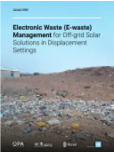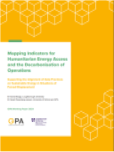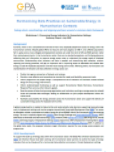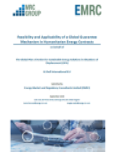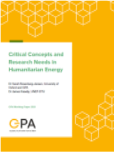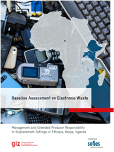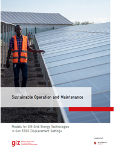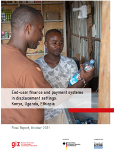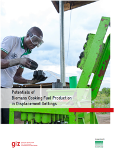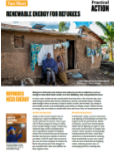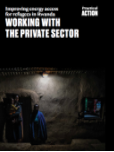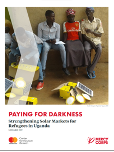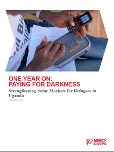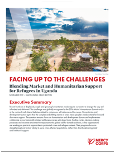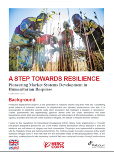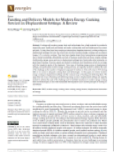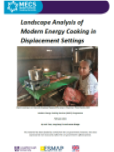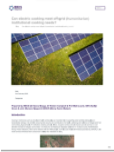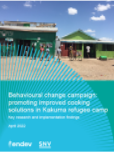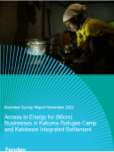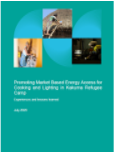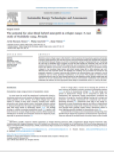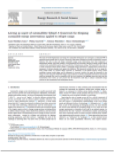In this section
In this sectionPlease find below a list of major publications on the Humanitarian Energy. If you would like to add your publication to this list, please contact us.
|
The State of the Humanitarian Energy Sector (SOHES): Challenges, Progress and Issues in 2022 |
||
|
|
|
The GPA State of Humanitarian Energy Sector (SOHES) report is the first of its kind analysis of the main issues facing the humanitarian energy sector. The report, which is jointly co-authored by GPA steering group institutions Chatham House, IOM, SEforALL, GIZ, Practical Action, NORCAP, Mercy Corps, Selco Foundation, the International Lifeline Fund, and UNHCR, places the voices of refugees and displaced people at the centre of humanitarian energy issues. The analysis delves into core cross-sectoral areas and explores their relevance within energy for displacement in 2022, such as governance and coordination, effective delivery, critical data, policy, funding and finance, as well as climate action. The final two chapters of the report present practical recommendations, outline advocacy targets and messaging, and suggest ways to drive the sector forward over the coming years. |
|
|
||
|
|
|
The GPA’s Framework for Action is a strategic document published in 2018 presenting the key challenges faced by the humanitarian energy sector. The document provides a set of non-binding recommendations and outlines the collective vision of the sector in line with reaching SDG7 targets. |
|
|
||
|
|
|
The 2022 joint report by the Norwegian Refugee Council (NRC) and the GPA highlights innovative financing for the humanitarian energy sector. The report provides an overview of blended finance mechanisms and the role of such mechanisms in delivering sustainable energy solutions as part of humanitarian response. |
|
Electronic Waste (E-waste) Management for Off-grid Solar Solutions in Displacement Settings |
||
|
|
|
The study by the GPA Coordination Unit and NORCAP helps to amplify the efforts on e-waste management in displacement settings. This report defines what e-waste from solar products is, identifies several e-waste management tools for humanitarian organisations, highlights the importance of circular economy principles, and provides a reflection on the findings and recommendations for key actors. |
|
|
||
|
|
|
The joint report by the GPA and Loughborough University summarises several resources to guide practitioners and donors in understanding humanitarian energy data needs. This work aims to support the production of high-quality, usable energy data for the humanitarian sector and practitioner partners in delivering sustainable energy solutions. |
|
Harmonising Data Practices on Sustainable Energy in Humanitarian Contexts |
||
|
|
|
This analysis provides an understanding of what indicators and data are needed aiming to streamline data collection, analysis, reporting and sharing processes essential for improving access to affordable and reliable clean energy at scale for displaced populations. |
|
Feasibility and Applicability of a Global Guarantee Mechanism in Humanitarian Energy Contracts |
||
|
|
|
The report identifies globally relevant, adaptable mechanisms that facilitate long term energy agreements (power purchase agreements and lease agreements) between humanitarian actors and third-party renewable energy providers. |
|
|
||
|
|
|
This report provides a summary of some of the key issues for research, evidence, and data in the humanitarian energy sector. It also outlines the priority activities identified by the GPA Research and Evidence Group. |
|
|
||
|
|
|
As a basic manual for e-waste trainers, this publication assembles compact information about e-waste in theory (definitions, global and local implications), practical dismantling of different types of equipment, output fractions after manual dismantling, the management of a small scale recycling facility (including the calculation of business opportunities), and the organising of trainings. |
|
|
||
|
|
|
The manual offers analysis into challenges that exist making energy access technologies Operation and Maintenance (O&M) in displacement settings more complex. Such challenges are associated with the existence of language barriers among refugees, the weak presence of solar companies as well as the low profitability of operations in camps and settlements. This manual helps develop concepts for O&M business models for selected technologies and models for community-owned assets. A key set of recommendations for improvements in the regulatory and business environment for sustainable O&M models for off-grid technologies are also listed in this manual. |
|
End-user finance and payment systems in displacement settings: Kenya, Uganda, Ethiopia |
||
|
|
|
This study analyses and develops end-user finance solutions and payment systems that can be applied in ESDS’ project settings for energy products and services by considering necessary preconditions. This project report focuses on stock-taking and conceptual development to improve access to end-user finance and payment systems to increase the demand for energy products and services in ESDS project settings with market-based approaches. The report focuses mainly on three countries: Kenya, Uganda, and Ethiopia. |
|
Potentials of Biomass Cooking Fuel Production in Displacement Settings |
||
|
|
|
This study assesses the use of energy for cooking in three refugee-hosting areas of Uganda, Ethiopia and Kenya. It investigates options for sustainably sourced, biomass-based cooking fuels in West Nile, Gambella Region and Turkana County. |
|
|
||
|
|
|
The fact sheet provides a summary of the Practical Action and UNHCR - Renewable Energy for Refugees (RE4R) project - showcasing market-based innovative financing approaches that took in two countries: Rwanda and Jordan. The fact sheet summarises and showcases the end of project data, and focuses on energy delivery based on supporting households, securing livelihoods and improving the quality of life in homes and communities. |
|
Improving energy access for refugees in Rwanda: Working with the private sector |
||
|
|
|
This report by the Renewable Energy for Refugees (RE4R) project shares the lessons learnt and recommendations on how to partner with the private sector to bring about systemic changes in the markets needed to better deliver sustainable energy access for refugees. |
|
Paying for Darkness: Strengthening Solar Markets for Refugees in Uganda |
||
|
|
|
This research explores pay-as-you-go solar energy markets as a mechanism to improve energy access for refugees. |
|
|
||
|
|
|
Mercy Corps implemented activities addressing five identified market constraints based on an early market systems analysis in the Bidi Bidi refugee settlement (Uganda) identifying key barriers to Off-Grid Solar (OGS) and PAYGo products reaching refugee and host consumer markets. This paper summarises the outputs of a short evaluation undertaken to assess the intervention’s impact, and extract learning for future interventions. |
|
Blending Market and Humanitarian Support for Refugees in Uganda |
||
|
|
|
This report explores blending market and humanitarian support for refugees in Uganda. |
|
A Step Towards Resilience: Pioneering Market Systems Development in Humanitarian Response |
||
|
|
|
Mercy Corps is responding to the South Sudanese refugee influx in Uganda by testing the use of a market systems development approach to build the resilience of refugee and local communities. This pilot evaluation provides a greater understanding of what is possible, raises critical issues about which components of a market-based approach work well in the context of Northern Uganda, and where investment is required to further support learning on market-based information gathering, change and development. |
|
Funding and Delivery Models for Modern Energy Cooking Services in Displacement Settings: A Review |
||
|
|
|
Cooking with modern energy fuels and technologies has a high potential to positively impact the users’ health and well-being, and make cooking safer and less burdensome for women and girls. This paper argues that new ways of funding and delivering energy access in displacement settings are urgently needed to address the scale of the challenge and to facilitate transitions to modern energy cooking fuels and technologies, in line with Sustainable Development Goal 7 and the principle of ‘leaving no one behind’. |
|
Landscape analysis of modern energy cooking in displacement settings |
||
|
|
|
This report analyses the landscape of modern energy cooking in a diversity of displacement settings. It seeks to identify the drivers and constraints for the transition from traditional biomass fuels to modern energy cooking. The study focuses on displacement settings in 15 countries in Sub-Saharan Africa (Ethiopia, Ghana, Kenya, Malawi, Rwanda, Tanzania, Uganda, Zambia, Cameroon, the Gambia and Nigeria) and South, South-East Asia (Bangladesh, Cambodia, Myanmar and Nepal). |
|
Can electric cooking meet off-grid (humanitarian) institutional cooking needs? |
||
|
|
|
This blog discusses recent research activities by MECS, SNV and UNHCR to explore the potential use of electric cooking to meet the off-grid institutional needs in humanitarian settings. The project is exploring potential e-cooking opportunities for an institution in the Kakuma refugee camp, North-Western Kenya, where a standalone solar PV system is planned for installation in the coming months. |
|
|
||
|
|
|
The report presents the research findings for the development and implementation of a behavioural change communication (BCC) campaign for host and refugee community members in Kakuma to become aware of, purchase and consistently use improved stoves at the household and commercial levels. The BCC campaign is part of the EnDev Market Based Energy Access project implemented by SNV which works to increase the availability and demand for improved stoves and solar products in the local markets in Kakuma refugee camp, Kakuma town and Kalobeyei integrated settlement. |
|
Access to Energy for (Micro) Businesses in Kakuma Refugee Camp and Kalobeyei Integrated Settlement |
||
|
|
|
In early 2020, SNV ran a market survey among 859 businesses in the Kakuma refugee camp and Kalobeyei Integrated Settlement in Turkana County, Northern Kenya to gather data and information about energy access among the camps’ business community and inform future interventions and market development activities. The survey report presents the findings and provides recommendations on how clean energy suppliers can tap into this market opportunity and enable refugee entrepreneurs to access electricity and clean cooking solutions for their businesses. |
|
|
||
|
|
|
The Market-Based Energy Access (MBEA) project was designed to drive a shift from a humanitarian, donation-based approach to market-based energy access for refugees in Kakuma refugee camp, Kalobeyei integrated settlement, and the surrounding host community. SNV implemented the pilot phase of the project between October 2017 and September 2019 with funding from the Energising Development (EnDev) programme. MBEA II launched in October 2019. The report presents the experiences and lessons learned from the MBEA pilot project with an overview of the project design, activities, results, lessons learnt, and key recommendations. |
|
|
||
|
|
|
This study examines the potential for solar and solar-hybrid mini-grids to provide sustainable electricity in Nybiheke Refugee Camp, Rwanda. Using techno-economic modelling and financial analysis, the study finds that sustainable mini-grids can reduce costs by over 30% and reduce greenhouse gas emissions by over 80% whilst meeting the needs of both institutional users and refugee businesses. |
|
|
||
|
|
|
The multifaceted nature of sustainability and the specificities of displacement settings should be accounted for when planning energy interventions. This paper presents an implementation-focused framework for the holistic planning of energy projects incorporating inclusive design approaches, energy system modelling, business model design, and economic assessments. It is applied to an illustrative case study of a solar mini-grid for Holl Holl Refugee Camp, Djibouti, to design an intervention compatible with the local needs and context. |
Last updated: 24/05/2022




